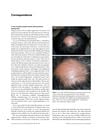 36 citations,
August 2009 in “PubMed”
36 citations,
August 2009 in “PubMed” The review suggests seeing a dermatologist for scarring hair loss and using treatments like minoxidil or finasteride for common male and female pattern hair loss.
 35 citations,
November 1931 in “Journal of Genetics”
35 citations,
November 1931 in “Journal of Genetics” Hairless mice lack fur due to a genetic mutation affecting skin response, not hormone issues.
 10 citations,
August 2012 in “Current Problems in Pediatric and Adolescent Health Care”
10 citations,
August 2012 in “Current Problems in Pediatric and Adolescent Health Care” Hair changes can indicate systemic diseases or medication effects.
 9 citations,
January 1987 in “Journal of The American Academy of Dermatology”
9 citations,
January 1987 in “Journal of The American Academy of Dermatology” A man lost a lot of scalp hair quickly after stopping minoxidil, but it grew back with mild male pattern baldness.
 4 citations,
April 2014 in “Journal of Pharmacology and Pharmacotherapeutics”
4 citations,
April 2014 in “Journal of Pharmacology and Pharmacotherapeutics” The boy's hair loss was caused by the tuberculosis drug isoniazid but grew back after stopping the medication.
 2 citations,
June 1980 in “International Journal of Dermatology”
2 citations,
June 1980 in “International Journal of Dermatology” Scalp biopsies are important for diagnosing hair loss conditions.
 1 citations,
October 2022 in “European medical journal”
1 citations,
October 2022 in “European medical journal” The congress highlighted concerns about the effectiveness of over-the-counter nail treatments, the link between hair loss and daily care products, and the safety of skin treatments during COVID-19.
 1 citations,
September 2019 in “BMC veterinary research”
1 citations,
September 2019 in “BMC veterinary research” Malarone® caused pancreatitis and hair loss in a dog for the first time.
 1 citations,
February 2015 in “Clinical and Experimental Dermatology”
1 citations,
February 2015 in “Clinical and Experimental Dermatology” A man got six skin cancers within a year after a cell transplant for leukemia but was cancer-free 32 months later; skin checks are important post-transplant.
 October 2024 in “Journal of the Endocrine Society”
October 2024 in “Journal of the Endocrine Society” Ovarian steroid cell tumors can mimic adrenal hyperplasia, and surgery can normalize hormone levels.
 September 2022 in “Journal of Case Reports and Medical History”
September 2022 in “Journal of Case Reports and Medical History” Many new moms lose hair after childbirth due to hormonal changes, but it usually grows back within a year.
August 2018 in “Ayurline: IJ-RIM” Diet and lifestyle changes can help manage hair loss in alopecia.
 February 2017 in “International Journal of Research in Dermatology”
February 2017 in “International Journal of Research in Dermatology” A six-year-old girl unusually had a hair loss condition common in middle-aged women.
 January 2014 in “International Journal of Trichology”
January 2014 in “International Journal of Trichology” A man had an unusual type of hair loss that didn't match known patterns and didn't improve with treatment.

Early treatment is important for better hair regrowth in elderly women with hair loss.
 May 2009 in “South African Family Practice”
May 2009 in “South African Family Practice” The author believes that giving medical conditions official names can sometimes overwhelm or scare patients.
 January 2003 in “Postgraduate medicine”
January 2003 in “Postgraduate medicine” The article concludes that hair loss has many causes and treatments, with medication options like finasteride and minoxidil for men, and minoxidil, hormones, or iron for women, while warning against unproven remedies.
 January 1998 in “Current Therapeutics”
January 1998 in “Current Therapeutics” Different causes of hair loss require specific treatments, and most men and women will experience some form of hair thinning as they age.
 July 1975 in “Archives of Dermatology”
July 1975 in “Archives of Dermatology” Stopping tetracycline can lead to the disappearance of flat warts.
 January 2014 in “International Journal of Trichology”
January 2014 in “International Journal of Trichology” Hair changes are common in AIDS patients and can add to their financial and emotional stress.
 11 citations,
July 2008 in “International Journal of Dermatology”
11 citations,
July 2008 in “International Journal of Dermatology” Greying hairs may be protected from alopecia areata.
 8 citations,
May 1941 in “Science”
8 citations,
May 1941 in “Science” Mouse embryos can develop in chick embryos, but they grow smaller with some organ issues.
 8 citations,
May 1941 in “Science”
8 citations,
May 1941 in “Science” Inositol helped cure hair loss around rats' eyes and improved their growth.
 1 citations,
February 1999 in “Journal of Paediatrics and Child Health”
1 citations,
February 1999 in “Journal of Paediatrics and Child Health” The document concludes that each reviewed medical book is useful for its specific area in pediatric care, especially the "Neonatal Formulary" for neonatal drug information.
 January 2016 in “Reactions Weekly”
January 2016 in “Reactions Weekly” A girl's hair loss from a pharmacy error improved after getting the right medicine.
 44 citations,
December 2010 in “Journal of Investigative Dermatology”
44 citations,
December 2010 in “Journal of Investigative Dermatology” Alopecia areata seriously lowers quality of life, especially affecting self-image, mental health, and social life.
 34 citations,
May 2013 in “Journal of the European Academy of Dermatology and Venereology”
34 citations,
May 2013 in “Journal of the European Academy of Dermatology and Venereology” Hair growth slows and shedding increases after childbirth, but most women don't experience excessive hair loss.
 30 citations,
May 1991 in “Psychosomatics”
30 citations,
May 1991 in “Psychosomatics” Some psychiatric medications can cause reversible hair loss.
 23 citations,
July 2021 in “Advances in Therapy”
23 citations,
July 2021 in “Advances in Therapy” Most people with Alopecia Areata don't get treatment within a year; it's costly and often comes with other health issues.
 15 citations,
January 2000 in “Dermatology”
15 citations,
January 2000 in “Dermatology” Minoxidil use may cause skin pigmentation loss.





























